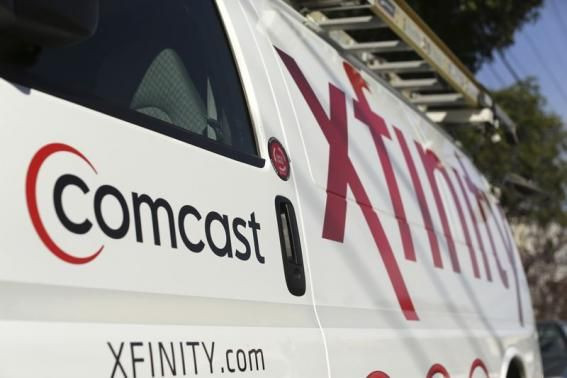Comcast Customer Service? Not Terrible But Nonexistent, Call Center Workers Say

When a painfully circular phone conversation between a journalist and a Comcast Corp. (NASDAQ:CMCSA) representative went viral last week, it reminded everyone of a widely held fact: The world’s largest pay-television company is not particularly known for its stellar customer support. As it turns out, Comcast doesn’t appear to have a dedicated customer-service department at all.
According to current and former call-center employees, almost every phone representative who takes customer-service calls for Philadelphia’s $67 billion cable colossus is really a salesperson in disguise. Are you calling in with a technical question, connection problems or billing concerns? In any case, expect to reach someone whose job it is to sell you more stuff, even if the stuff you already have isn’t working.
It’s not an easy gig. Comcast employees describe a taxing corporate culture in which anyone who fails to meet an expansive myriad of metrics, including closing a sale whenever possible, is ultimately cut loose. “They are under a lot of pressure to upsell,” one former Chicago-area phone rep told International Business Times. “There is no motivation to solve a problem unless it could result in an upsell.”
And upselling alone isn’t enough. You have to do it quickly. The company keeps meticulous track of average call times within each department (generally around seven minutes per call), and employees whose calls routinely go over are disciplined for their perceived lethargy.
“Even if you’re making the sales for them, if you can’t do it in the time allotted, you’re going to have a problem,” said Cody Phipps, a 24-year-old phone rep from southwestern Virginia, who took calls for Comcast for seven months before quitting his job in November 2013.
Phipps was one of the few phone reps we could find who would speak on the record. Most did not want to be identified, either because they currently work for Comcast or did not want to damage their prospects for future employment. Numerous tipsters seemed eager to speak out at first but then stopped responding to requests to comment. All of those sources dropped off without explanation and ignored repeated attempts to follow up, leaving us only to speculate about what gave them cold feet. Reddit is rife with comment threads and AMAs from people who identify themselves as current or former Comcast employees, but the Redditors we contacted insisted on staying anonymous out of concern that the information they provided would be linked back to their Reddit accounts.
One reason Phipps was so forthcoming is because he was never technically employed by Comcast. Like a lot of Comcast phone reps, he worked for a company you’ve probably never heard of: Convergys Corp. (NYSE:CVG), a Cincinnati-based company that provides customer-service personnel to major telecoms. Comcast is Convergys’ third-largest client, accounting for 12.4 percent of its revenue last year, according to an SEC filing. Convergys is sometimes described as a bait and switch: Prospective hires are wooed by recruiters who downplay the sales aspect of the positions they are looking to fill. Once assigned to Comcast projects, phone reps are forced to play by Comcast’s rules. Phipps called Convergys “some of the nicest people” he’s ever met, and said he would likely still be working there had he not been assigned to Comcast.
Marred In Metrics
A spokeswoman for Comcast declined to say how many of its phone reps work for third-party companies like Convergys, but she did confirm that Comcast sets the metrics for all of its phone reps. Sales and average call times are just part of the equation: The company also looks at things like “first-call resolution,” or preventing the need for a customer to follow up with a second call. Employees we spoke with said when customers call back within 30 days, it reflects negatively on the phone rep they reached the first time around.
And you know those customer-satisfaction surveys Comcast asks you to take? Those can count against phone reps too -- something to be aware of the next time you use one to vent your frustrations at the company. “Most individuals are upset at Comcast and not the representative’s performance,” one former Comcast employee said in an email, adding that surveys play a role in retaining employment. In other words, employees can take the fall for Comcast’s faulty operations.

Add it all up and you have an often-oppressive mound of statistics to work under. Employees say supervisors can be ruthless in their drive to maintain team-wide metrics, but some expressed sympathy knowing that supervisors are “not in control” and don’t have “any influence on what corporate dictates.” Phipps said his team saw extremely high rates of turnover during his time there. “They just burn people out and chew through them,” he said.
Phipps, who spoke with IBTimes by phone last week, has an easygoing Southern drawn that is charming enough to placate even the most irate customer. But he said the emphasis at Comcast is not on making customers happy -- it’s on making them more lucrative. Even cash-strapped customers who call Comcast looking for ways to lower their bill can be turned into a sale. The trick? Offer them a new package with a low introductory rate, Phipps said. “By the third year they’ll be paying more than they were.”
Expectations vary by department, but Phipps said he was required to make a sale in at least 5 percent of his incoming calls. Comcast points out that the vast majority of its phone reps’ salaries come from hourly wages, but a spokeswoman declined to be specific about sales quotas. Phipps said he received similar mixed messages from his supervisors. “They talk about how the quota is not really important, but that is one of the main things that they really pump,” he said. “They want you to sell. If you don’t pitch on a call where somebody has less than one of their Triple Plays, you’re going to be in trouble for it.”
As Comcast seeks regulatory approval for its proposed merger with Time Warner Cable Inc. (NYSE:TWC), its notably low-ranked customer service came under extra scrutiny last week in the wake of the audio clip heard around the world, which showed a Comcast representative essentially refusing to disconnect a customer’s service. To some extent, the company is a victim of circumstance. Cable companies are generally low-ranked for a variety of reason, as Philadelphia magazine pointed out earlier this year. And since customers pretty much only call their cable providers when they’re furious about something, it doesn’t hurt to muster a little sympathy for the stress-ridden folks on the receiving end of said fury.
For now, Phipps is unemployed, seeking work in the tech industry. It’s not the ideal situation, but he said it beats the alternative. “I was literally dreading going into work,” he said. “Soul-sucking jobs don’t bother me on the whole, but this one was too much.”
Got a news tip? Email me. Follow me on Twitter @christopherzara.
© Copyright IBTimes 2024. All rights reserved.






















